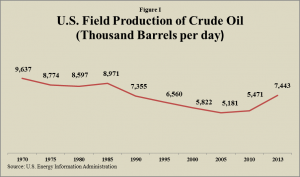Reducing Europe’s Dependence on Russia, Benefits United States
As tensions over the situation in the Ukraine heightened over the last few months, sanctions were thrown left and right between Russia, the United States and the European Union. The sanctions targeted the Russian banking and energy sectors, putting pressure on Russian President Putin’s inner circle.
Since the sanctions, Russia has lost $75 billion in capital worth, faces weaker direct investment and is teetering on the brink of recession, according to the BBC.
Unfortunately, Russia wasn’t the only one impacted by the sanctions. As one of the biggest energy suppliers in the world, Russia ranks in the top five producers of both petroleum and natural gas and is a huge energy supplier to the E.U. Sanctioning Russia could very well backfire on many E.U. nations.
So the question remains: how can the global community, and in particular the U.S., take action against Russia without risking E.U. economies?
According to Stephen Cheney’s Wall Street Journal op-ed, the answer is simple: expediting the export of liquefied natural gas (LNG) from the U.S. to the E.U. and its neighbors.
Oil and natural gas sales accounted for 68 percent of Russia’s total export revenues in 2013, according to the U.S. Energy Information Administration (EIA). From natural gas alone, Russia took in $73 billion last year.
The U.S. has seen booming growth in the natural gas industry over the past few years, and that growth is only expected to continue. According to Cheney, a recent Citigroup study predicted that the U.S. energy industry would add 665,000 new jobs and be a net exporter of energy by the end of the decade, and that by 2035 $115 billion would be added to the U.S. gross domestic product.
Creating U.S. LNG exports would transfer $4 billion in wealth from Russian consumers to European consumers, according to a 2013 Deloitte study. Additionally, says Cheney, reducing Europe’s dependence on Russia would increase the national security of both the U.S. and its allies. Yet the U.S.’s restrictive export laws only allow exports to be sent to nations with which the U.S. has a free-trade agreement, or after a lengthy permit process to ensure the export is within “the public interest.”
If opening up U.S. exporting restrictions to allow U.S. companies to export liquid natural gas could increase natural security, add jobs, and increase the security of our allies, shouldn’t that fall within “the public interest?”
Megan Simons is a research associate at the National Center for Policy Analysis.

